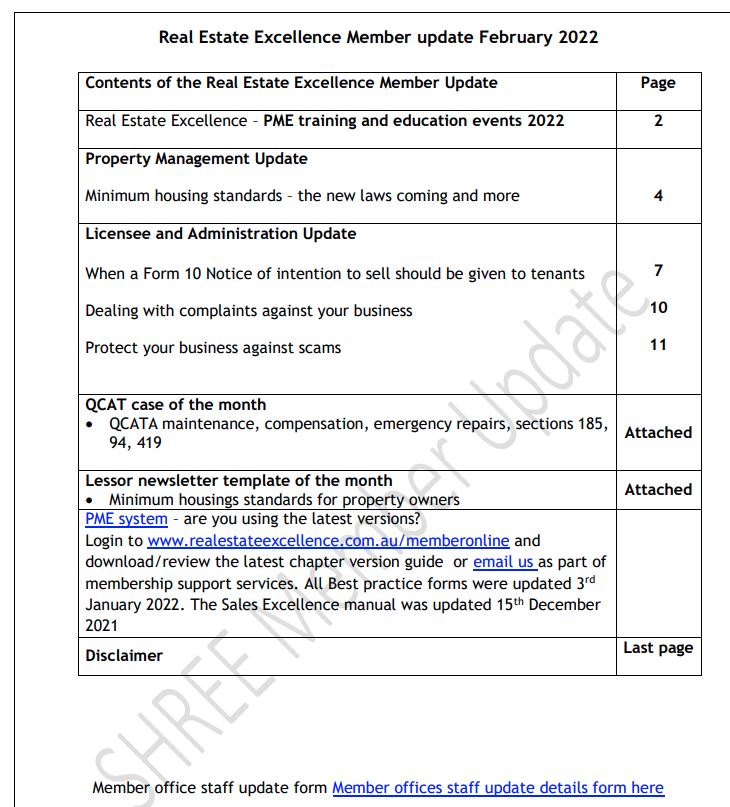Member Update February 2022
24th February 2022
|
|||||||||
|
|||||||||
|
17th February 2022
Email received from ADL
ADL have today released new versions of our residential sales contracts in response to client requests - the main change dealing with settlement failure.
Key areas of change are:
- Settlement Failure Provisions
- Provisions for Electronic Transfer of Deposits
- Additional Smoke Alarm Provisions
Compliance
These improvements to the ADL Sales Contracts are as a result of client requests and the previous version of the Contracts were compliant with relevant legislation (including the relevant Smoke Alarm Legislation) and ADL confirms the new versions of the Sales Contracts continue to comply.
Settlement Failure - Extension Provisions
These new provisions have been added as a direct result of the recent well publicised case of a couple losing their deposit because their financial institution was not ready for settlement.
Our new Clause 12.3 (Settlement - Extension Provisions) has been drafted to cater for settlement failure because of failure or inability by:
- a relevant financial institution to comply with an instruction or requirement under either Clause 12.1 or 12.2, where such failure or inability does not arise due to any act or omission by a party; or
- an e-conveyancing platform provider, or user of such platform (including a party to the Workspace), to facilitate Settlement due to system or connectivity failure.
Such failure will result in an automatic 1 day extension to settlement. Where a 1 day extension has occurred, either party may, by notice to the other party, advise of an additional extension of up to, but no more than, 4 days.
Electronic Transfer of Deposits
A new Clause 3.4 (in respect of deposit payments) has been added as a result of client requests to allow the standard 2 business days delay for monies to arrive in a recipient's account, where paid electronically.
Smoke Alarms
Even though our previous version of the contracts were compliant with relevant smoke alarm legislation, we have added a new clause to clarify which party is responsible for compliance with the Fire and Emergency Services Act 1990 (and Regulations thereto) and how such compliance will be satisfied.
Refer House and Land Contract Clause 8.17 or Community Title Contract Clause 8.16.
Other Changes
Other changes have also been made to ensure greater clarity throughout the contracts. For full details of all changes made click on the links below:
House and Land Contract Changes
Community Title Contract Changes
To view a copy of each contract click on the links below:
1st February 2022
5 day extension to settlement now available in Queensland.
On 20 January 2022 the REIQ released new versions of its contracts for the sale of houses and apartments in Queensland. The new contracts contain a number of amendments. But most importantly they contain a new Clause 6.2 which gives either party the ability to unilaterally extend the Settlement Date for up to 5 business days.
This is a significant change as it will give both buyers and sellers the ability to extend the date for settlement for 5 business days if their bank is not ready to complete the contract on the due date. Previously the Settlement Date could only be extended with the agreement of both the buyer and seller.
There are, however, a couple of key points to note. Read more here.
27th January 2022 - February Member update
The February 2022 Real Estate Excellence Member Update is now at Member login (realestateexcellence.com.au) (latest member update folder) and will be emailed to Members on the 2nd February 2022. The contents are below.
As per past Member updates in 2021, including an attachment called Sales and new smoke alarm laws which formed part of the December 2021/January 2022 emailed to Members on the 7th December 2021, below is part of an article from The 2022 smoke alarm legislation: How does it impact properties being sold? – Proctor (qlsproctor.com.au)

